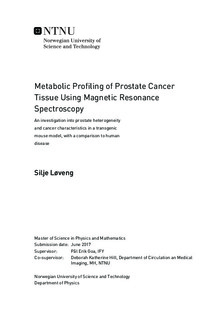Metabolic Profiling of Prostate Cancer Tissue Using Magnetic Resonance Spectroscopy - An investigation into prostate heterogeneity and cancer characteristics in a transgenic mouse model, with a comparison to human disease
Master thesis
Permanent lenke
http://hdl.handle.net/11250/2465044Utgivelsesdato
2017Metadata
Vis full innførselSamlinger
- Institutt for fysikk [2695]
Sammendrag
Using 1H High-Resolution Magic Angle Spinning Magnetic Resonance Spectroscopy, tissue samples of both healthy mouse prostate and different grades of mouse prostate cancer in a transgenic mouse model were analysed to investigate which metabolites that are present at different stages of mouse prostate cancer. The trends in the metabolic changes were compared to human prostate cancer, and found to be of similar nature, with elevation of lactate, alanine, creatine, taurine and glycine, and decreased levels of citrate, glycerophosphocholine, phosphocholine and choline.
Differences in the metabolism of the four distinct lobes of the mouse prostate were also looked into, and large variations between the lobes were identified. The ventral prostate of mice seem to be the one that mimics human prostate cancer the best, despite being claimed to have no human counterpart based in previous histology. The large differences between the lobes imply that great care should be taken when measuring metabolite levels, as inconsistencies could lead to misinterpreting results.
Future work should include histopathology to secure proper classifications of the mouse prostate cancer, and comparison with human disease could be improved by performing absolute quantification and including more metabolites.
